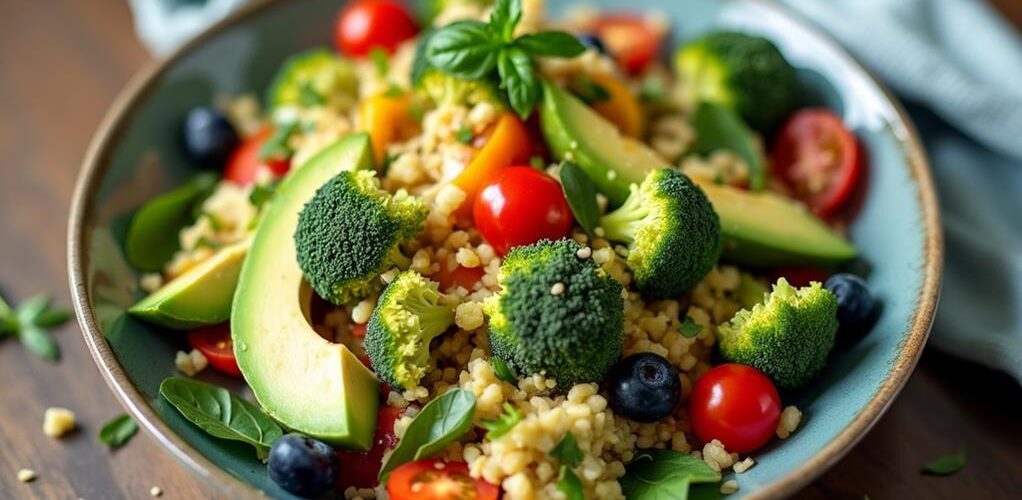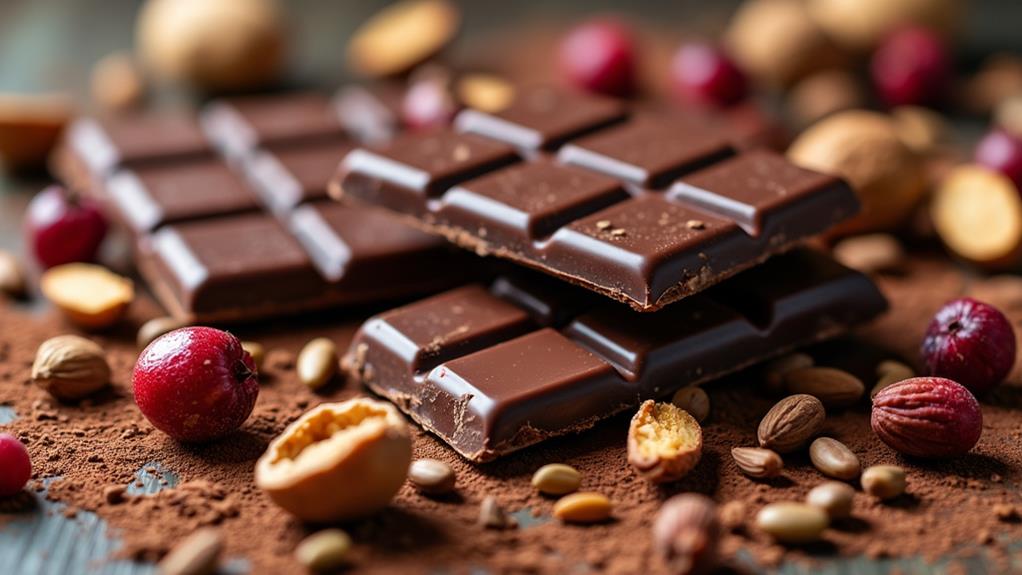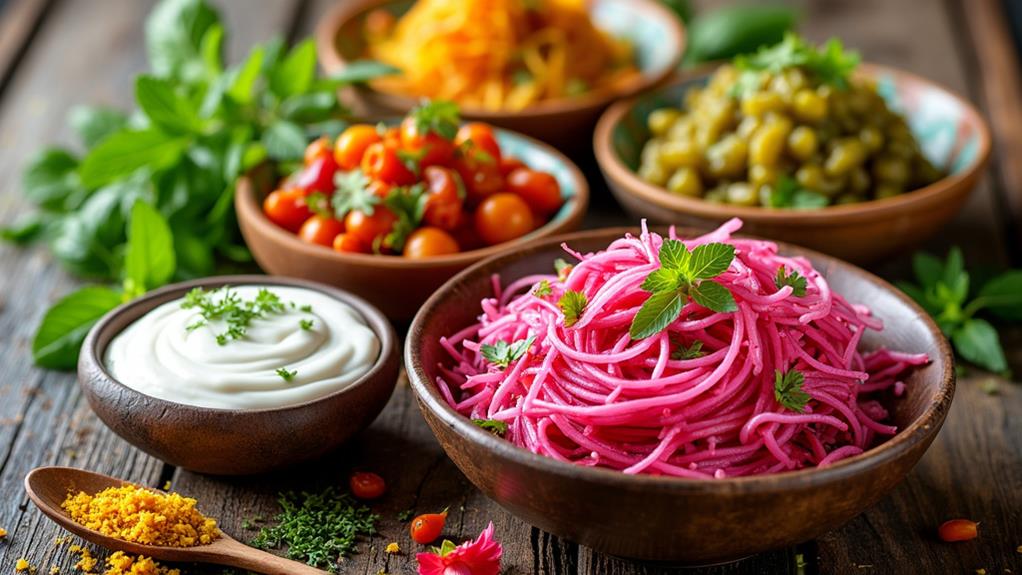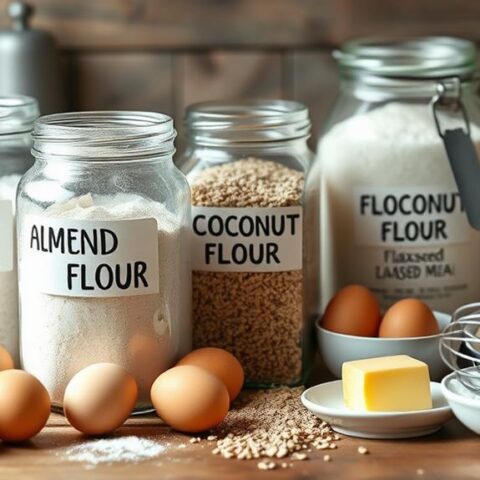
Incorporating fiber into a keto diet is essential for sustaining digestive health. Opt for high-fiber fruits like avocados and berries. Include fiber-rich vegetables such as broccoli, asparagus, and spinach. Nuts and seeds, especially chia seeds and almonds, provide substantial fiber. Coconut products, particularly coconut flour and milk, enhance fiber intake while keeping carbs low. Dark chocolate with 70% cocoa offers a sweet fiber boost. Sea vegetables like nori and kelp add dietary fiber with minimal carbs. Probiotic foods, including sauerkraut and kimchi, support gut health. Finally, using fiber supplements and planning fiber-rich meals can help you achieve balance on a keto diet. Discover further details to optimize your nutrient intake.
Key Takeaways
- Incorporate high-fiber fruits like avocado, raspberries, and blackberries into your diet.
- Add fiber-rich vegetables such as broccoli, cauliflower, and Brussels sprouts to your meals.
- Use nuts and seeds, especially chia seeds and flaxseeds, as snacks or toppings.
- Integrate coconut products like coconut flour and milk in your recipes for added fiber.
- Consider fiber supplements like psyllium husk to boost your daily fiber intake.
Choose High-Fiber Fruits
When following a ketogenic diet, incorporating high-fiber fruits can markedly enhance nutritional intake while maintaining low carbohydrate levels.
Avocado stands out as one of the most potent fiber sources, containing 9 grams of fiber per medium fruit and only 2 grams of net carbs. This makes it an ideal addition to any keto meal plan, providing not just fiber but also healthy fats. Additionally, avocados are high in potassium, offering around 975 mg per medium fruit, which supports overall health.
Raspberries are another excellent choice, offering 4 grams of fiber and merely 3.3 grams of net carbs per half cup. Their low-carb profile and high fiber content make them perfect for fruit combinations in keto-friendly desserts or snacks.
Similarly, blackberries contribute approximately 5 grams of fiber and 5 grams of net carbs per 100 grams, making them a versatile and nutrient-dense option.
Strawberries, with around 2 grams of fiber and 5.5 grams of net carbs per 100 grams, are suitable for those who crave something sweet without derailing their diet.
Finally, coconut delivers 4 grams of fiber and 3 grams of net carbs per small piece. This not only provides essential fats but also guarantees a significant fiber intake.
These high-fiber fruits collectively support digestive health while adhering to ketogenic principles.
Opt for Fiber-Rich Veggies
In addition to high-fiber fruits, incorporating fiber-rich vegetables into a ketogenic diet can further enhance nutrient intake while adhering to low carbohydrate limits.
Vegetables such as broccoli and asparagus are excellent choices for maintaining fiber intake without exceeding keto's strict carbohydrate constraints. Broccoli benefits include its impressive fiber content, with 5 grams of fiber and only 6 grams of net carbs per 150 grams. This cruciferous vegetable not only supports digestive health but also provides essential vitamins like C and K.
Asparagus is another viable option, delivering 3 grams of fiber and just 3 grams of net carbs per 160 grams. Incorporating asparagus recipes into your meal plan can help you enjoy its digestive health benefits while keeping carbohydrate intake in check.
The versatility of cauliflower, which contains about 2 grams of fiber and 3 grams of net carbs per 100 grams, allows for creative low-carb recipes like cauliflower rice or mash.
Spinach, with approximately 4 grams of fiber and a mere 1 gram of net carbs per 100 grams when cooked, is a versatile vegetable that can be added to various dishes.
Brussels sprouts offer around 4 grams of fiber and 5 grams of net carbs per 100 grams, enhancing satiety and nutrient density.
Include Nuts and Seeds
Incorporating nuts and seeds into a ketogenic diet is an effective strategy for enhancing fiber intake while adhering to low carbohydrate limits.
Nut varieties such as almonds not only provide 3.5g of fiber per ounce but also contribute merely 2.5g of net carbs, making them an excellent choice for keto followers. Similarly, chia seeds stand out among seed benefits, offering an impressive 9.75g of fiber per ounce and just 2.2g of net carbs. These can be effortlessly included in smoothies or puddings, enriching both texture and nutritional profile.
Pumpkin seeds are particularly beneficial, providing 1.7g of fiber and only 1g of net carbs per ounce, and are high in iron and magnesium.
Flaxseeds are another valuable addition, with 1.9g of fiber per tablespoon and virtually zero digestible carbs, making them a versatile ingredient in keto recipes.
Pumpkin seeds also offer substantial benefits, providing 1.7g of fiber and only 1g of net carbs per ounce, suitable as a nutritious snack or topping for salads.
Incorporating a variety of nuts and seeds into daily meals not only boosts fiber intake but also adds healthy fats and protein, which are essential for maintaining overall health on a low-carb diet.
This dietary strategy guarantees that fiber requirements are met without compromising the principles of the ketogenic lifestyle.
Use Fiber Supplements
Fiber supplements serve as a strategic adjunct to a ketogenic diet, addressing the common challenge of meeting fiber requirements while maintaining low net carbohydrate intake. Psyllium husk is one such supplement that provides a substantial boost in dietary fiber with minimal net carbs, making it ideal for digestive health on a keto regimen.
Metamucil, a widely used fiber supplement, offers approximately 3 grams of soluble fiber per serving, contributing to daily fiber goals without disrupting ketosis. Incorporating whole foods like nuts and seeds alongside these supplements can further enhance nutrient intake and support digestive health.
When incorporating fiber supplements, it is vital to take into account supplement timing and hydration. Increased fiber intake, particularly from supplements, necessitates adequate water consumption to prevent digestive discomfort.
Fiber powders containing inulin or acacia fiber are particularly beneficial as they not only add minimal carbs but also offer prebiotic benefits, supporting gut health.
Before beginning any fiber supplementation, consulting a healthcare provider is essential. This guarantees the chosen fiber types align with individual dietary needs, particularly within the constraints of a low-carb diet.
Such professional guidance helps optimize the benefits of fiber supplements while avoiding potential gastrointestinal issues, thereby improving overall adherence to the ketogenic lifestyle.
Try Coconut Products
Incorporating coconut products such as coconut flour and coconut milk into a keto diet can greatly enhance fiber intake while maintaining low net carb counts.
Coconut flour, with its high fiber content, offers a nutritious alternative for baking, while coconut milk adds both creaminess and fiber to various dishes. These ingredients are particularly beneficial because they can address common keto diet issues like constipation by promoting digestive health.
Furthermore, coconut flour requires adjustments in liquid for baking, ensuring that your recipes stay moist and delicious. Utilizing these products can help manage common low-carb diet issues, such as constipation, by promoting digestive health.
Coconut Flour Benefits
Offering a myriad of benefits, coconut flour has emerged as a favored low-carb alternative to traditional flours, making it particularly suitable for a keto diet. With approximately 10 grams of fiber and just 8 grams of net carbs per 1/4 cup serving, coconut flour is an excellent choice for those looking to increase their fiber intake while adhering to a low-carb regimen.
Importantly, coconut flour recipes require specific baking adjustments due to its high moisture absorption. Typically, additional liquids must be incorporated to achieve the desired consistency in baked goods.
Coconut flour is also rich in medium-chain triglycerides (MCTs), known for their ability to support energy levels and promote fat burning, aligning well with the principles of a ketogenic diet. Additionally, it is gluten-free, making it an ideal choice for individuals with gluten sensitivities or celiac disease.
This nutritional profile not only enhances the fiber intake but also supports overall digestive health, which is essential for those on a keto diet that may lack traditional fiber-rich foods.
Incorporating coconut flour into your diet can offer multiple health benefits, making it a versatile and nutrient-dense option for keto-friendly baking and cooking.
Incorporating Coconut Milk
Although often overlooked, coconut milk stands out as a nutrient-dense, versatile ingredient that seamlessly fits into a ketogenic diet. Containing approximately 2-3 grams of fiber per 100 grams, coconut milk benefits those looking to increase their fiber intake while maintaining low carbohydrate levels. This makes it an ideal option for keto enthusiasts who need to manage their digestive health effectively.
Unsweetened coconut milk can be incorporated into keto smoothies, soups, or sauces, adding a rich creaminess alongside healthy fats and fiber. This not only enhances flavor but also supports overall digestive health on a low-carb diet. The use of coconut milk provides a practical way to achieve the recommended fiber intake without compromising the principles of ketosis.
In addition to coconut milk, other coconut products such as shredded coconut and coconut flour are excellent fiber sources. Shredded coconut offers around 7 grams of fiber per 100 grams and can be sprinkled on salads, yogurts, or desserts.
These products contain medium-chain triglycerides (MCTs), which provide energy and support gut health by promoting beneficial bacteria growth. Incorporating these elements into a keto diet can greatly enhance fiber content while maintaining nutritional balance.
Add Psyllium Husk
Psyllium husk, a powerhouse of soluble fiber, stands out as an exceptional addition to a ketogenic diet. Rich in health benefits, it provides about 8 grams of fiber per tablespoon while containing less than 1 gram of net carbs. This makes it an ideal choice for those following a low-carb regimen. Psyllium husk significantly supports digestive health by promoting regular bowel movements and alleviating constipation, a common issue for individuals on low-carb diets.
Incorporating psyllium husk into your daily diet can be both functional and versatile. It acts as a binding agent in baking, enhancing the texture of low-carb bread and baked goods without adding significant carbs. Additionally, mixing psyllium husk into smoothies or yogurt can increase fiber intake effortlessly, helping you meet the daily recommended intake of 25-38 grams for peak health.
| Application | Benefit |
|---|---|
| Baking | Acts as a binding agent |
| Smoothies | Boosts fiber intake |
| Yogurt | Enhances daily fiber consumption |
| Regular use | Promotes digestive regularity |
| Adequate hydration | Prevents bloating and discomfort |
Always verify to drink plenty of water when consuming psyllium husk, as it absorbs water and expands in the digestive tract, thereby preventing bloating and discomfort.
Enjoy Dark Chocolate

Incorporating dark chocolate with 70% cocoa or higher into a keto diet can be a strategic way to increase fiber intake while indulging in a low-sugar treat. A single ounce provides approximately 3 grams of fiber and helps maintain ketosis by containing only 10-15 grams of net carbs.
Selecting high-cocoa varieties and consuming them in moderation can satisfy cravings and contribute to feelings of fullness, aiding in weight management.
Additionally, dark chocolate contains antioxidants, which can offer potential health benefits.
Choose High-Cocoa Varieties
The allure of dark chocolate lies not only in its rich, complex flavors but also in its nutritional benefits, making it an excellent choice for those on a keto diet. High-cocoa dark chocolate varieties, specifically those with at least 70% cocoa content, are low in sugar and packed with essential nutrients, including fiber and antioxidants.
The dark chocolate benefits extend beyond mere taste, offering significant cocoa health effects that align well with keto dietary principles. One ounce of dark chocolate (70-85% cocoa) contains approximately 3-4 grams of fiber, contributing to daily fiber goals and aiding in digestion.
The high cocoa content is also associated with improved heart health and reduced inflammation due to its rich flavonoid content. When selecting dark chocolate, it is vital to opt for brands with minimal added sugars and high cocoa percentages to maintain keto compliance.
Key points to take into account:
- High fiber content: Helps meet daily fiber intake.
- Low in sugar: Suitable for keto dietary restrictions.
- Rich in flavonoids: Offers potential heart health benefits.
- Reduced inflammation: Associated with high cocoa content.
- Satisfies sweet cravings: Provides a healthy alternative to sugary snacks.
Choosing high-cocoa dark chocolate can seamlessly integrate into a fiber-rich keto diet.
Savor in Moderation
Balancing indulgence and dietary discipline, dark chocolate can be a delightful addition to a keto diet when savored in moderation. Dark chocolate, especially those with 70% cocoa or higher, is low in sugar and rich in beneficial nutrients, making it an excellent keto snack idea. A one-ounce serving of dark chocolate provides approximately 3 grams of fiber, keeping net carbs low and aligning with keto guidelines.
The dark chocolate benefits extend beyond its fiber content. It is rich in antioxidants, which can help improve heart health and lower blood pressure. To maximize these benefits while adhering to your keto diet, moderation is paramount. Consuming small portions can satisfy your cravings without exceeding daily carbohydrate limits.
Pairing dark chocolate with high-fiber nuts or seeds can further enhance the fiber content of your snack, keeping it both nutritious and keto-friendly. Below is a table highlighting the nutritional impact of such combinations:
| Snack Combination | Fiber Content (grams) | Net Carbs (grams) | Antioxidants | Keto-Friendly |
|---|---|---|---|---|
| Dark Chocolate (1 oz) | 3 | 5 | High | Yes |
| Dark Chocolate + Almonds | 5 | 4 | High | Yes |
| Dark Chocolate + Walnuts | 4.5 | 3.5 | High | Yes |
| Dark Chocolate + Chia Seeds | 6 | 4 | High | Yes |
| Dark Chocolate + Flaxseeds | 5 | 3.5 | High | Yes |
Incorporating these keto snack ideas into your diet can help you enjoy the dark chocolate benefits without compromising your nutritional goals.
Explore Sea Vegetables
Amidst the vast array of dietary options available, sea vegetables stand out as a remarkable addition to a keto diet due to their exceptional fiber content and low-calorie profile.
These nutrient-rich marine plants, including nori, dulse, and kelp, offer significant sea vegetable benefits, particularly in enhancing fiber intake without adding excessive carbs. For instance, nori, familiar to many through its use in sushi, provides approximately 4 grams of fiber per 100 grams while remaining low in net carbohydrates.
Additionally, non-starchy vegetables like spinach and kale can also complement sea vegetables to boost nutrient intake while staying within keto guidelines.
Dulse is another nutrient-dense option, delivering around 8 grams of fiber per 100 grams and a wealth of minerals, especially iodine, which supports thyroid function. Similarly, kelp offers about 1.5 grams of fiber per 100 grams and is also rich in iodine, thereby aiding in thyroid health.
These sea vegetables can be seamlessly incorporated into various culinary uses to enhance both flavor and nutritional value.
- Nori: Ideal for sushi rolls or as a garnish for soups.
- Dulse: Can be added to salads or used as a seasoning.
- Kelp: Suitable for broths, soups, or as a noodle substitute.
- Sea Lettuce: Excellent in salads or as a dried snack.
- Arame: Perfect for stir-fries or as a side dish.
Incorporating sea vegetables into meals not only boosts fiber intake but also enriches the diet with essential nutrients, making them an excellent choice for those on a keto diet.
Incorporate Probiotic Foods

Incorporating probiotic foods such as sauerkraut, kimchi, and fermented dairy products into a keto diet can greatly enhance gut health by promoting beneficial bacteria.
These low-carb options not only provide essential probiotics but also contribute valuable fiber, which helps mitigate digestive discomfort commonly associated with a low-fiber diet.
Regular consumption of these foods supports nutrient absorption and overall digestive well-being.
Gut Health Benefits
Probiotics play an essential role in enhancing gut health, particularly when following a keto diet. The introduction of probiotic-rich foods like sauerkraut and kimchi can greatly benefit the gut microbiota by providing beneficial bacteria that aid in digestion and nutrient absorption. This is vital for maintaining digestive comfort, especially on a diet that is high in fat and low in fiber.
Incorporating fermented foods such as yogurt and kefir can improve the diversity of gut microbiota, which is essential for overall gut health. This diversity can also help alleviate constipation, a common issue on low-carb diets. Additionally, probiotic foods such as miso and tempeh help balance gut flora, potentially enhancing digestive regularity and comfort.
Regular consumption of probiotic foods has several gut health benefits:
- Enhanced production of short-chain fatty acids (SCFAs): Supports gut barrier function and may reduce inflammation.
- Improved nutrient absorption: Beneficial bacteria aid in the breakdown and assimilation of nutrients.
- Increased gut microbiota diversity: Essential for robust gut health and digestive efficiency.
- Alleviation of constipation: Probiotics can help maintain regular bowel movements.
- Support for healthy gut flora: Balances the gut environment, promoting overall digestive comfort.
Low-Carb Options
Utilizing low-carb options that incorporate probiotic foods can be an effective strategy for maintaining gut health while adhering to a keto diet.
Sauerkraut benefits are notable, offering up to 2 grams of fiber per serving alongside beneficial probiotics that support digestive health. Including sauerkraut in your meals can be a straightforward way to boost fiber intake without compromising carbohydrate limits.
Similarly, kimchi provides around 1.5 grams of fiber per serving. Various kimchi recipes can be integrated into your keto meal plan, enhancing both flavor and nutritional value with its rich probiotic content. The fermentation process in both sauerkraut and kimchi fosters beneficial bacteria, which can aid in digestion and improve gut flora diversity.
Artichokes are another excellent low-carb option, supplying about 7 grams of fiber and a wealth of antioxidants to support overall health. Adding artichokes to your diet can greatly enhance fiber intake.
Miso and kefir also contribute soluble fiber and probiotics. Miso can be easily added to soups or dressings, while kefir can be incorporated into smoothies or salad dressings, adding versatility without exceeding carbohydrate restrictions.
Incorporating these probiotic-rich, low-carb foods can help maintain gut health and guarantee adequate fiber consumption on a keto diet.
Plan Fiber-Rich Meals
Planning fiber-rich meals on a keto diet is essential for maintaining digestive health and ensuring nutrient intake without compromising ketosis. Effective meal prep and strategic ingredient swaps can help you achieve this balance.
Incorporating leafy greens like spinach and kale as meal bases is a smart move, given their low carb and high fiber content. These greens provide essential nutrients while keeping you in ketosis. Leafy greens are also associated with improved blood sugar control and insulin sensitivity.
Enhance your meals with fiber-rich vegetables such as broccoli, cauliflower, and Brussels sprouts. These vegetables offer significant fiber content with minimal net carbs. Adding healthy fats to your salads, such as avocado or olive oil, can further boost your fiber intake. For instance, a medium avocado contains about 9 grams of fiber, making it a nutrient-dense choice.
Experiment with nuts and seeds, like chia seeds and flaxseeds, as toppings for yogurt or salads. Chia seeds, in particular, provide 9.75 grams of fiber per ounce.
Additionally, plan snacks around fiber-rich options to meet the recommended daily intake of 25-38 grams.
- Leafy greens as meal bases
- Fiber-rich vegetables
- Healthy fats like avocado and olive oil
- Nuts and seeds
- Fiber-rich snacks like raw vegetables and nut butter
Frequently Asked Questions
How to Increase Fibre Intake on Keto?
To increase fiber intake on keto, incorporate high fiber snacks like almonds and chia seeds, and low carb vegetables such as spinach, broccoli, and kale. Additionally, consider avocado and fiber supplements like psyllium husk to meet fiber goals.
How to Get 30G of Fiber on Keto?
To achieve 30g of fiber on a keto diet, incorporate high-fiber sources such as broccoli, Brussels sprouts, nuts, seeds, avocados, and berries. Additionally, consider fiber supplements like psyllium husk to meet your daily fiber goals.
What Foods on Keto Have Fiber?
Low carb vegetables like broccoli and avocados offer substantial fiber while maintaining keto compliance. Additionally, keto friendly snacks such as chia seeds and almonds provide significant fiber content, enhancing nutrient intake without compromising carbohydrate restrictions.
What Helps Constipation on a Keto Diet?
To alleviate keto constipation, consider keto constipation remedies such as incorporating fiber-rich snacks like avocados and chia seeds, staying well-hydrated, and gradually increasing fiber intake with supplements like psyllium husk to support digestive health.
Conclusion
Incorporating fiber into a ketogenic diet requires strategic selection of nutrient-dense foods. Emphasis on high-fiber fruits and vegetables, nuts, seeds, coconut products, and dark chocolate can greatly enhance fiber intake. Additionally, exploring sea vegetables, probiotic foods, and fiber supplements further enriches the diet. Planning meals with these components guarantees a balanced approach, promoting digestive health and overall wellness while adhering to ketogenic principles. This methodology underscores the importance of dietary fiber in maintaining peak health within a low-carbohydrate framework.










No Comments